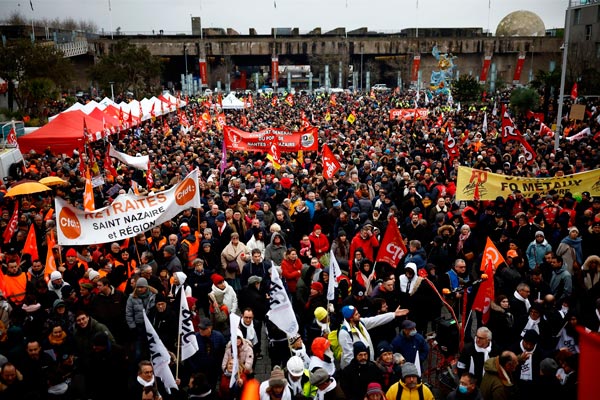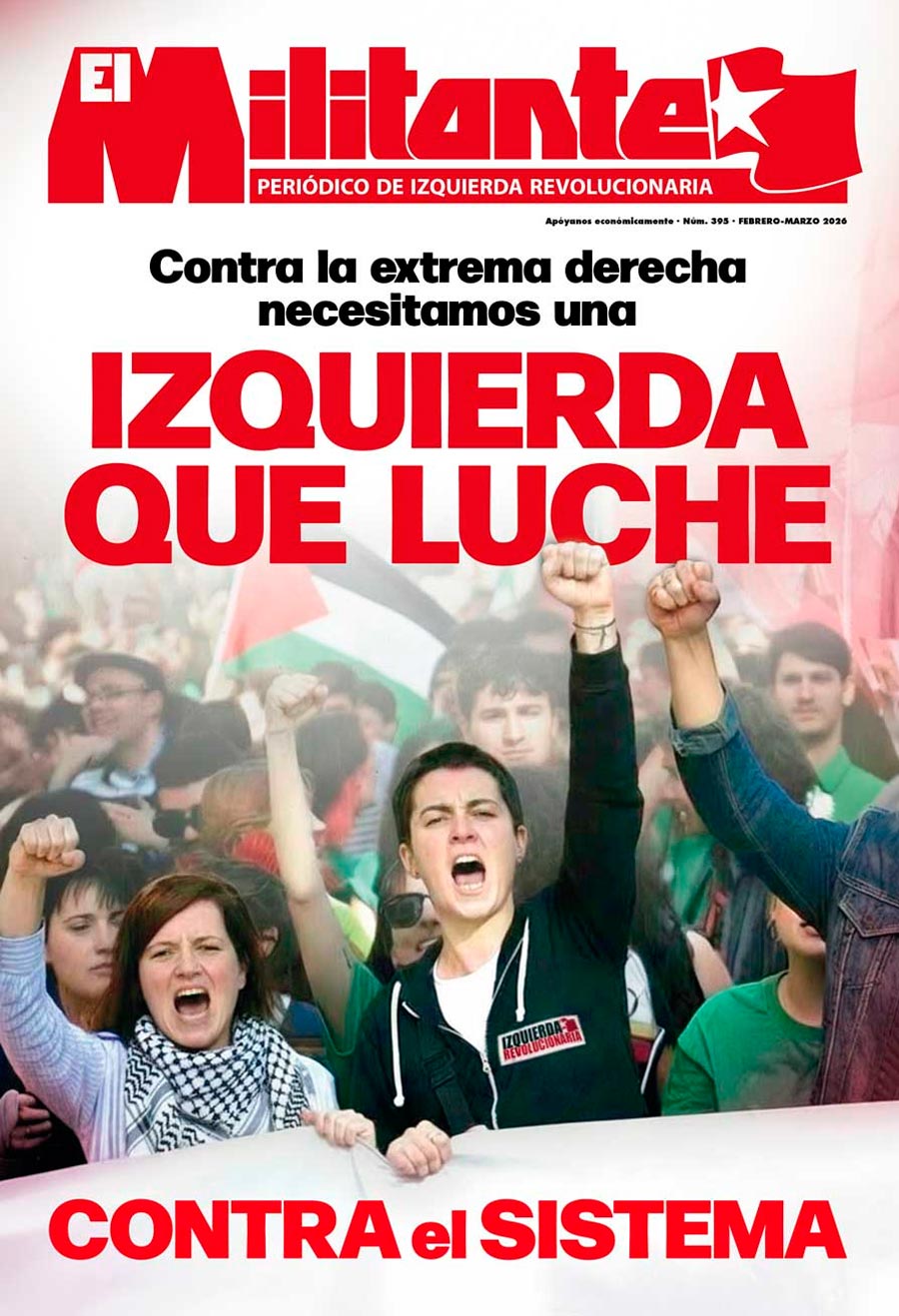If the unions don't go all out, Macron can impose his reform
After more than four months of intense struggle, the French working class and youth once again took to the streets en masse on May 1st, showing once again their complete rejection of the pension reform imposed by decree by the French government and the entire economic and social policy of President Macron.
But after that day an apparent calm reigns in the country. Although strikes over wage demands continue in many companies, the big demonstrations, where all these struggles converged and united in the common goal of pushing back the government and overturning the increase in the retirement age, have disappeared from the streets. The occupations of study centres continue, but the approaching end of the school year, coupled with selective repressive actions targeting the most active students, indicate that their moment of greatest strength is beginning to be behind them.
The reason for this social calm is to be found in the decision of the trade union organisations to postpone the next general mobilisation, the thirteenth since this struggle began, until 6 June, thus establishing, for all practical purposes, a five-week social truce.
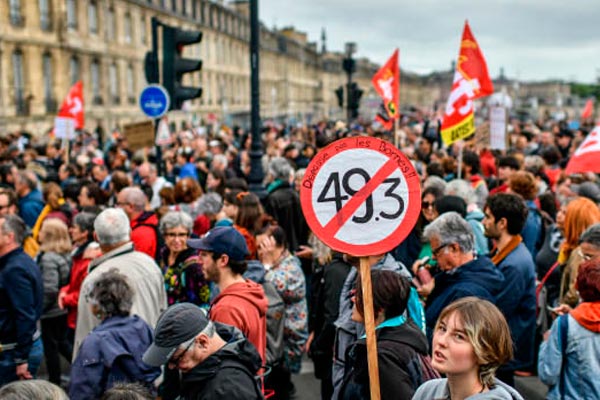
What reason can there be for such a decision? What sense can there be in paralysing the struggle at its height, when the working class was showing all its strength, and when the next step to win the battle would have been to call an indefinite militant general strike, in all sectors and enterprises, with mass assemblies and occupations until Macron's downfall is forced?
Does this truce respond to a change of mood in the working class movement, or are we facing a unilateral decision of some trade union and left leaders who have given up on continuing the confrontation with the state and the bourgeoisie to its ultimate consequences?
The French workers' uprising marks a before and after in the wave of mobilisations born in the wake of the great financial crisis of 2008 and its outcome will be of the utmost importance for the working class all over the world. That is why from the answers to the questions posed we will be able to draw lessons of enormous value for all of us who struggle to end capitalism.
The anger of the working class lives on
As we saw on May 1st, the will of the French workers and youth to fight has not diminished one iota. The latest polls on the pension reform prove it: 93% of the working population and 70% of the total population reject it.
The ruling class is fully aware of this reality. They have witnessed how the mobilisation on the streets has overflowed the pension protest into an open challenge to the power of their state and its institutions. Neither government decrees, nor presidential exhortations, nor even the decisions of the Constitutional Council stopped the anger of the masses. A challenge to the institutions of the bourgeois state in the present context of financial crisis and sharpening inter-imperialist tensions, of which the war in Ukraine is only a sample, is intolerable for the ruling class, affects its most vital interests, and therefore it has decided to fight a decisive battle to get its way and defeat the workers' movement.
Police repression, with displays of brutality and savagery unprecedented in a long time, proved useless to stop the movement. On the contrary, the more repression, the more the republican institutions were delegitimised in the eyes of huge sections of the population. So the French bourgeoisie had no choice but to try another way to stifle the mobilisation: the so-called social dialogue and the agreement from above with the trade union leaderships.
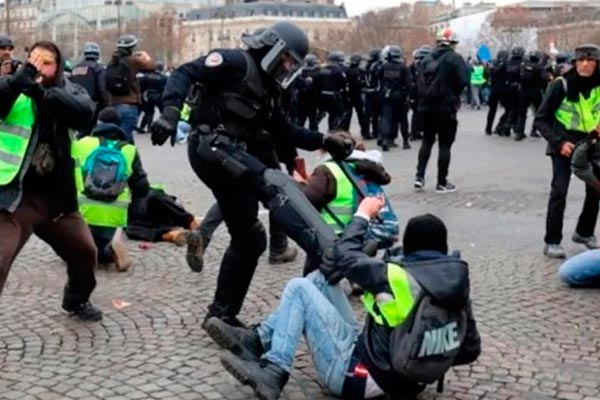
The CGT leadership chooses to back down
Faced with such a battle, in which the vital interests of the bourgeoisie are at stake, the only way for the working class to win is to use all its forces: to paralyse the country and economic life, to organise action committees in factories, enterprises , neighbourhoods, universities and high schools, and to coordinate these bodies to replace the institutions of the capitalist state, which have once again shown themselves to be a mere instrument of the financial oligarchy. In short, to fight for workers' power and a new organisation of society on a socialist, egalitarian and democratic basis.
The workers' uprising in France has put the question of power back on the agenda. Only the blind, wilfully or unwittingly, and the cynical refuse to see it. But the ruling class is not at all afflicted by this blindness. The rise of violent fascist groups which, with the protection of the police, are becoming increasingly active, and the arsenal of repressive legislation with which the states are equipping themselves, should be a very clear warning sign. The class struggle has entered a decisive phase.
At the key moment, when the political quality of the leadership at the forefront of the battle is most important, the CGT leadership has chosen to retreat back to the failed terrain of the social pact. On 10 May, the new CGT general secretary, Sophie Binet, decided to take part in the meeting of the Economic, Social and Environmental Council, where, in front of the most elite of French business, she avoided addressing the issue of pensions and instead denounced the obsession with profitability of companies which, surprise surprise surprise, "treat prevention policies as if they were costs".
The next step was to accept a meeting with the president of the government, Elisabeth Borne, a decision that pleased Bruno le Maire, the finance minister, who saw it as a "very positive sign". The CGT will bring to this meeting the demand that public aid to French companies (more than 200 billion a year) should be conditional on "precise social criteria". Four months of historic mobilisation to end in this?
As expected, the meeting, which took place on 17 May, ended without any results and with Binet complaining that there had been no real "social dialogue". Of course! If you lower the pressure of the mobilisation without having achieved the proposed objectives, you will only make the government harden its position.
The delegates and militants of the CGT have been at the forefront of the struggles over the past months, forcing their leaders to go much further than they wanted. This immense pressure from their rank and file was reflected in their congress, which took place in the last days of March. Although the congress began with a defeat of the outgoing leadership, the union bureaucracy regained control and was able to minimise the weight of the left wing in the new leadership.
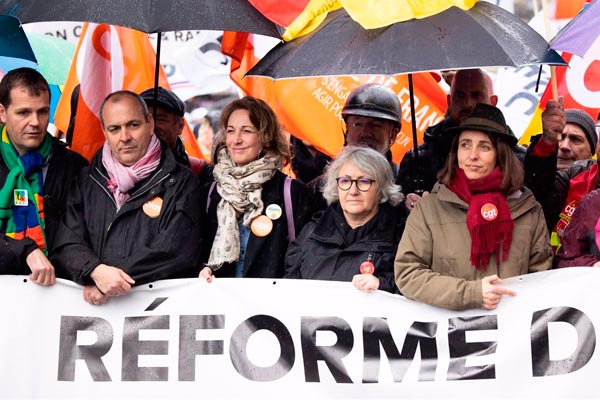
And having settled into their positions, the current leaders have decided to return to their 2016 strategy against Hollande's labour reform. At that time, faced with the immense wave of discontent that this law generated, the CGT leadership waited until the fatigue and wear and tear of the strikes began to be felt, and then, gradually and without ceasing to launch radical proclamations and to call for mobilisations increasingly more distant in time, "leaving freedom" to each sector in order to avoid the unification of the strikes, as now, it put the working class before the fait accompli that the reform had already been approved and that the battle had to continue in the courts. The struggle faded away, and the reform came into force without further obstacles.
The policy of the CGT leadership weakens the day of mobilisation on June 6
The working class and the youth are called by the CGT and the rest of the unions grouped in the Intersyndical to a new day of mobilisations on 6 June.
But what can we expect from that day when these same union leaders announce that "the struggle continues at least until June 8"? What can happen on that day that makes it unnecessary to continue this battle?
Well, on 8 June, the National Assembly will discuss a proposal by the LIOT parliamentary group (right-wing MPs who have left the major parties, Corsican MPs and MPs from the Overseas Territories), which has already received the support of Nupes, to repeal the pension reform and thus "prevent the country from being torn apart and to achieve peace".
Faced with this initiative, the Intersyndical has rushed, in its communiqué calling for the mobilisation on the 6th, to support this proposal and "solemnly calls on the deputies to take responsibility by voting in favour of it". They are thus turning the mobilisation of 6 June into a day of support for a parliamentary initiative of a right-wing group.
In conclusion, the leadership of the CGT and the other trade unions have decided to put all their trust in a group of liberal MPs and the Republicans (former Gaullists), who represent the conservative and reactionary right, with many points of contact with Le Pen. As the secretary general of the CGT, Sophie Binet, clearly recognises, "we have the opportunity to find a way out of the crisis from above". What a despicable confession of distrust in the working class and in her own trade union base, preferring a way out "from above" to a way out "from below", based on the struggle in the streets and in the work and study centres!
In the face of this turn, it is necessary to organise the rank and file of the CGT, who are in the majority in favour of continuing the battle, and to draw up a forceful militant plan of struggle. UnitéCGT, the current that groups together the left wing of the union, is in the best position to do this. In its communiqué of 16 May, UnitéCGT recognises that "what has been lacking until now is the confederal impulse of the CGT".
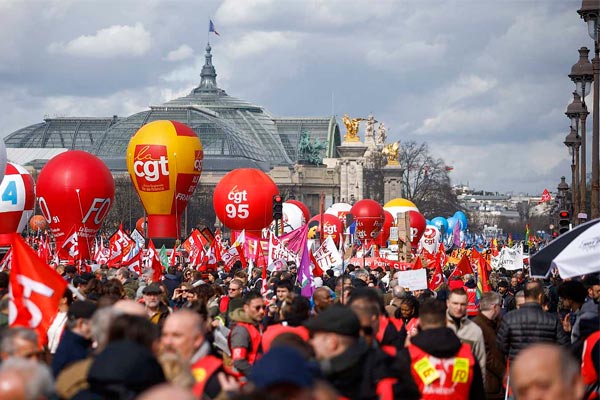
For if this impetus from the leadership is lacking, the urgent task is to make up for it through the coordination by the rank and file of all CGT sections, delegates and militants who are not prepared to give up continuing the struggle. Criticising the CGT leadership is not enough; it is now essential to build from below the militant trade union leadership without which the movement will not be able to meet Macron's challenge and achieve victory.
France Insoumise leaders support this shift towards demobilisation.
The active role that Jean-Luc Mélenchon and the FI MPs played in the first weeks of the French workers' uprising and their initiative to organise a resistance fund to support the strikers were met with open hostility by the CGT leadership, used to counting on the unconditional support of the parliamentary left.
Undoubtedly, the enormous social pressure also affected the leadership and militants of FI and this, together with the clear possibility of increasing its electoral support, pushed Mélenchon to play a prominent role as the driving force behind the mobilisation and to launch proclamations in a very radical line, calling to extend the struggle among the youth and non-unionised sectors, and rejecting the parliamentary manoeuvrings of the traditional parties.
However, the CGT leadership's turn towards moderation has been met with a "normalisation of relations" with FI, which has meant its abandonment of a confrontational strategy. The central point of this "normalisation" is a clear division of tasks, as CGT leader Binet explained very well: "In the same way that I believe that the left parties do not have to comment on the strategy chosen by the trade union organisations to lead the struggle, it is not up to us to comment on the strategy chosen to lead the struggle in the hemicycle". An approach that Mélenchon took up without qualification: "That we normalise our relations, obviously, I agree, and I think it's a very good answer. The central point: each in his or her own role".
This division of labour between the trade union bureaucracy and the politicians of the reformist left is not something new, but has been the norm in all epochs of capitalist normality and social peace. Only in situations of serious social crisis, with pre-revolutionary characteristics, like the one France is going through, the artificial boundaries between the trade union struggle and the political struggle crack and the struggle for better working conditions becomes a political struggle that can end up leading to a struggle for power.
However, right now, at a critical moment in the struggle, it does not seem that the FI leaders are willing to implement a strategy that would confront them with the trade union bureaucracy and put forward the fight for socialism in a consistent way. In their latest statements they have raised the slogan of a Constituent Assembly for the 6th Republic. But they do not speak of a Socialist Republic, but of a mere bourgeois parliament, albeit "more democratic" and with more "control by the people".
Really comrades, is this the fighting programme we need today to beat Macron and the oligarchy? A "better democracy", but respecting the capitalist order? A Parliament that is more agile and representative, and in exchange does not touch the private ownership of the means of production, does not defend the nationalisation of the banks and the monopolies? And will this ideal parliament purge the state apparatus, putting an end to the violence of the police forces and the impunity of fascist gangs?
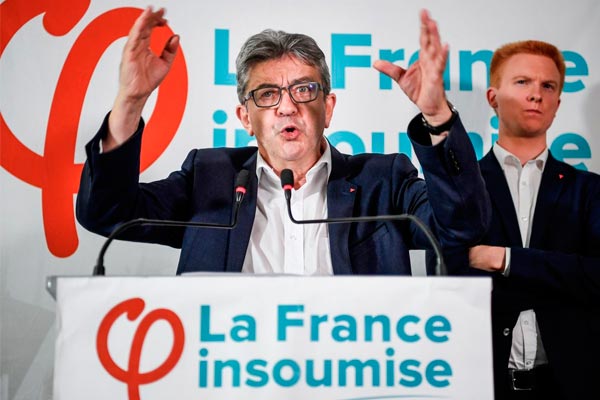
This demand for a new Constituent Assembly sounds like empty talk, an alibi for giving up the struggle for socialism, and a ploy to follow the path of demobilisation and make work easier for the trade union bureaucracy. With this approach, the FI leaders are making a serious mistake at the key moment of the battle against pension reform.
The threat of the extreme right and fascism
Mélenchon's main justification for this reconciliation with the CGT bureaucracy is the threat of fascism. Of course, the unity of the working class and its political and trade union forces to fight fascism is indispensable and very positive, but only if its programme and strategy of struggle are effective in combating it.
Experience teaches that the fight against fascism has to be based on class struggle, on the most massive and forceful mobilisation of the working class, raising self-defence organisations that fight the fascists with the most militant political action, and that fascism is only definitively defeated when the social system that engenders it and the ruling class that uses it to secure its interests is expelled to the dustbin of history.
The danger posed by Le Pen and his National Rally for the French working class and youth is increased by the fact that, with the greatest hypocrisy, they claim to defend the interests of the working classes and have opposed raising the retirement age. Some RN spokespersons have already announced that in the vote on 8 June the RN will vote in favour of repealing Macron's reform. Le Pen, as fascism has always done, is cloaking herself in demagogic language, supposedly "anti-capitalist" and against the "global elites", and is now trying to take advantage of popular anger to strengthen her positions, win militants and advance electorally.
If after months of mobilisation, after suffering repression, after suffering heavy wage deductions for participation in the strikes, the mobilisation is consciously stopped by the union leaderships and the pension reform continues, it is likely that demoralisation will, in the short term, take its toll on sections of the French working class. This is precisely the terrain that Le Pen is preparing to exploit.
To dismantle this fascist demagogy, the only viable way forward is to harden the mobilisation, break the social pact and launch a strong call for an indefinite general strike with occupation of workplaces and study places, reinforced by the constitution throughout France of action committees bringing together the entire working class and youth and beginning to take the necessary steps to take control of the day-to-day running of the country.
The French bourgeoisie is fully aware that it is facing a frontal challenge and is acting accordingly. It is confronted by a working class and a youth that have given an exemplary response that is equal to the circumstances. But a revolutionary leadership does not improvise, and that is what is needed in France and throughout the world.






